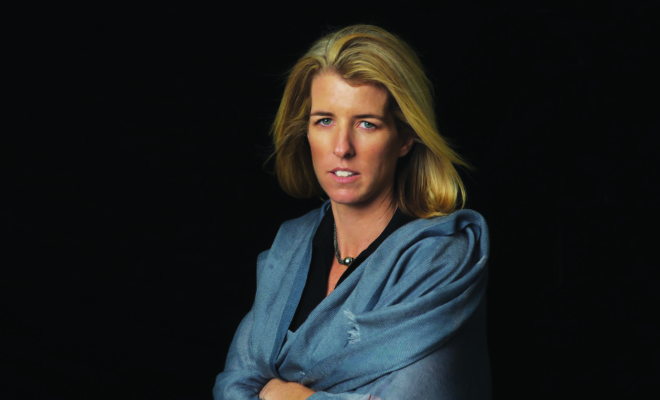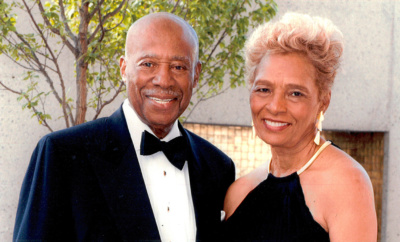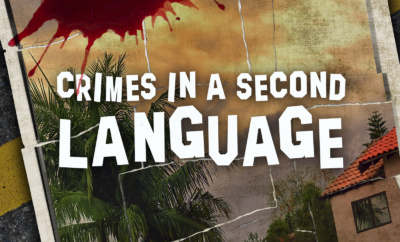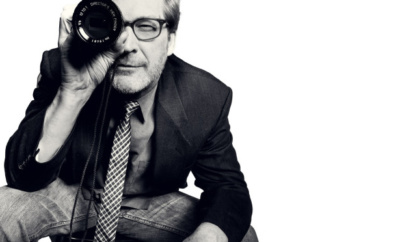
People
Scenes from an Interview: Filmmaker Rory Kennedy
by Gus Mollasis
Because she is a Kennedy, it should come as no surprise that she is resilient. It should also not be surprising that Rory Kennedy embodies a curious spirit to explore and get involved in the fabric of our American lives, with a noble goal that while doing so she will leave her mark and the world in better shape than before she got here. In that way, she shares not only the Kennedy name, but also many of the same hopes and dreams of her father, Bobby Kennedy, as well as her Uncle Jack, to make things better for our country and its people. In telling the stories that she chooses to focus on as an award-winning documentary filmmaker, she is not only merely asking us to watch, but also more importantly asking us to get involved. It matters not whether you are watching the Last Days in Vietnam, or the loving profile Ethel on her mother Ethel Kennedy, or exploring the plight of a struggling Appalachian family in American Hollow – one thing comes to light in every frame that she produces. You will become totally engaged with whatever story she is telling. It’s because she’s done the work and is totally engaged in the material. The result is always riveting documentary filmmaking. Her latest film, Take Every Wave: The Life of Laird Hamilton, captures that sense of adventure that she and her family know a lot about, and it opens the 19th Annual Sarasota Film Festival. As I spoke with Rory Kennedy on the phone, picturing that Kennedy smile and grace, and couldn’t wait to discuss the craft of filmmaking that she’s mastered and document some scenes from an interview of her life.
Your film Last Days in Vietnam was well received by the critics and public alike. As you look back at that experience, what does that film mean to you?
That film was a great experience for me and was a story that surprisingly had largely not been told. I think it’s a story that a lot of people think that they know. That was my experience going into it. And it turns out that only two of us knew much of what actually happened in the last 24 hours of that war. You don’t always come across amazing stories, and stories that have impact, and stories that help tell who we are as a nation and people, and as humans walking through the world. That story and that moment in history was so important to so many people. Because of the course of events and history of our nation, that was such revelatory moment. It was a great opportunity for me to share that with the American people. The ability to travel all across the country and attend screenings with the people and very poignantly with some Vietnamese Americans was hugely rewarding.
Out of all the films, is that film about Vietnam the one you are most proud of and would most have wanted your father to see?
I have never thought about in those terms. I’m proud of all my films in different ways. I think that they all have meaningful impact. I made a short called The Fence nine years ago that I think has a lot of resonance right now. Sometimes films become more relevant as time goes on. When I think of my first feature film, American Hollow, I will always look back at that experience in Appalachia and eastern Kentucky and living with an Appalachian family down there on and off for the course of a year. That was an extraordinary experience for me. And of course Ethel was very personal. When I made a film called Ghosts of Abu Ghraib that shed light on our torture history in this country, that filled in a lot of the pieces for a lot of people to fully understand what happened there.
What is the greatest thing you learned from your mother in making the film Ethel?
I will tell you that I knew a lot of the pieces of that story. I’m not sure that there was anything in there that was completely new information for me but in looking at the old footage of her, it was more about really appreciating everything that she went through and was living through at a time when she had so many children. And how both my mother and father kept that balance, keeping the focus on the children, while doing enormously important work has been a huge revelation, particularly now in my life when I have three children of my own, and a profession as a filmmaker where you have to interweave so many things. I think with my mom there was deep, deep commitment to public service and not in any superficial way, but looking over the course of her life you see what her priorities have been and the decisions that both she and my father made over those years. I have footage of them speaking about it, and it ran deep in their souls, and was such a profound commitment for them.
When you look back at your parents, are you ever amazed at how they balanced it all and accomplished so much?
Well part of how they did it was they brought the kids with them to everything. (Laughs) There were no boundaries in those typical ways. They understood that they had some real opportunities to improve people’s lives. I think they did a lot of internal and spiritual work along the way at a time when our country was changing enormously and the assumptions were changing. I think they were also evolving as people and were not the status quo with anything. As people, they were on a constant learning curve and that’s quite inspiring.
Your latest film, Take Every Wave: The Life of Laird Hamilton, opens the Sarasota Film Festival just as Last Days in Vietnam opened up the festival a few years ago. If my memory serves me right, you had your daughter with you on opening night.
Yes, I have three children and I think my daughter Bridget was with me on that night. It was a very special night and the film was warmly received in Sarasota.
What do you hope people take away from the screening of Take Every Wave: The Life of Laird Hamilton?
Obviously it’s a different kind of film then some of the films we just talked about and that was part of the appeal of it. It’s nice for all of us to simply challenge ourselves with a different kind of challenge. In this case, how do we capture an extraordinary athlete on enormous waves and how do you capture a life where it can go beyond the interest of purely the surf world, in which he’s had such an impact. One of the things that was of great interest to me was that Laird is not only known as one of the greatest surfers in the world, but he’s also pushed the sport like nobody else has over the last 50 years and arguably over the last 100 years. So, it is that kind of commitment to innovation and continuing to not only push himself into things that felt scary, dangerous, daunting and unchartered territories, and also pushing the sport in a similar way. Those are the kind of values that I’ve always respected. Courage. Commitment. And dealing with life’s challenges. And in a different sphere, those were similar values to the ones growing up in my family. I think that there is a lot to learn from these kinds of physical challenges. I grew up in a family where on family vacations we would go rafting, skiing and sailing, and just being in nature. What we learned from that, my family, my mother and father and my uncles and aunts, those were important values to them as well. When my Uncle Jack died, you know my father went and climbed Mount Kennedy as a way of processing that. It’s not entirely unfamiliar to me, that is Laird’s attributes and what drives him. That question of what drives him to do these things that nobody has done before was what was appealing to me. I wasn’t interested in following a surfer for a year. I’m not a surfer. (Laughs) Surfing is interesting and beautiful and super cool, but that’s not what attracted me to the story and made me want turn over my life for a year. It was his drive to do things that nobody has done and his drive to do that and what we can all learn from that. That is what was interesting to me.
When did you first know that you wanted to be a filmmaker?
Maybe my senior year in college, I started thinking about making a film. It was really thought of as a one-off. I never went to film school or took film classes, but I did come out of college and made a film based on the final paper I had done in school. I really loved the process and everything I learned from it, albeit the combination of the creativity to the storytelling to having the ability to move people and have a social impact in the world. People gather so much information from the media, TV and from watching movies that it seemed like a nice place to invest my energy and produce some things that I was interested in and somewhat capable of doing.
Is there a filmmaker out there that you’ve looked at as being one of your mentors?
I was aware in college of and had great admiration for the work of Barbara Kopple, the great female director. I loved the series, Eyes on the Prize, so I had some awareness of film having the ability to make a social impact. Now I have enormous respect for so many filmmakers in our field, every single one of the people who were nominated this year for an Academy Award for documentary features are all so fantastic. I have never seen so many people who have risked their lives. I have huge respect for so many filmmakers, my partner Liz Garbus. I love Michael Moore’s film and Heidi Ewing – an endless number of people that I won’t go through them all. I do feel that it’s an extraordinary community, and it’s great that Sarasota provides an outlet for it to showcase their extraordinary films and stories that they make.
Your husband, Mark Bailey, is also a filmmaker. What is the greatest thing you learned from him in film and in life?
I learn so many things from my husband. He’s my partner in work and my partner in life. He is the person I most admire in the world. On a classical filmmaking level, he comes to it as a writer and that’s his training. He is very disciplined and documentaries are kind of a funny thing because they’re real life and you’re also making a movie. You take elements that you might see in dramatic film and apply them to a documentary genre. So you figure those things out and how that works. When you make a film like Last Days in Vietnam, people would come up to me all the time and say to me, ‘This is like a thriller. I was on the edge of my seat the whole time.’ So you want people to be engaged, and to do that you have to incorporate writing and structure techniques that are going to deliver that, obviously not at the expense of truth, but by sticking to the story at hand. You’re making choices that help make the audiences feel engaged. So I think in that capacity he’s made an enormous contribution to all the films I’ve made.
Finish the following sentences:
A documentary should teach you…
I think the great thing with documentaries is that you can have a sense of compassion and understanding of people or stories or situations that might be foreign to you and that you might not experience in your own life. And I think that is especially important in this day and age when there is such divisiveness in our country and there is a lack of understanding of how people are feeling on the other side. I think that documentaries can help bridge those gaps. It can show why somebody does what they do and have the story that they have. I think it can really teach – if you want me to be literal – compassion.
A documentary should never…
Not be truthful…
A Kennedy is…
A lot of things.
A Kennedy always…
That’s difficult because with the Kennedys there are a lot of us with so many different and varied interests, so that’s impossible to answer.
A great film should always…
Inspire.
What is the hardest aspect of being a documentary filmmaker?
The hardest thing about making documentaries is that they are hard. It’s like writing a book. You have to do the work. There is not a formula. Each one creates its own challenges. There is funding; figuring out the story; filming people; getting people to say yes when they often say no; figuring out what the story is in the editing room; distribution and getting it out to the public. I love all the challenges and they’re always new and they keep you on your toes. I appreciate that about film.
When you leave the planet, hopefully many years from now, what do you hope people say about you and your films?
I would hope that these films helped deepen people’s understanding, bridged divides, created more compassion, and ultimately led to policies that helped people live healthier and live to their fullest potential.
Spoken like a true Kennedy.







You must be logged in to post a comment Login